Editor's note: This story, originally shared by the author in 2014, should serve as a reminder of the dangers that all rivers pose, especially in extreme conditions. Be safe out there.
I have a cautionary tale I’d like to share. Forgive me for not painting a more eloquent picture, but everything is still a bit too real, and raw, to gussy it up with pretty writing.
Yesterday was January 2, 2014. It was also very nearly the last day of my life.
I drove down to the Missouri River on New Years Day — Wednesday, the 1st — hoping to take advantage of the 40 degree weather and test a bunch of fly fishing gear. I spent most of the afternoon on the river, and despite the cold water temps — it was in the 33 to 34 degree range — I had solid fishing and the opportunity to check out a number of new rods, reels, waders, jackets, packs, etc.
For those of you who don’t know the Missouri, it’s a big, wide, open river near the tiny Montana towns of Wolf Creek and Craig. It deserves respect — as does any big river — but it’s not the kind of water that typically gets people in trouble. Yesterday was a little different.
More Like This
There’s a good-sized island I like to fish upstream from the Wolf Creek Bridge. At low water levels — and the river is low right now — I can wade out to the island and then hit the productive water all around. Yesterday I waded out to the island and walked downstream to the very bottom end. There was another angler fishing the slot where I’d usually start, so I went down below him, making sure to leave him plenty of room. I started casting a G Loomis 10’ 7-weight with a sink tip line and a new streamer pattern I’ve been playing around with.
There was a fair amount of ice in the lee of the island, sitting in shallow, protected water and anchored to the shore. I can’t tell you exactly how big that hunk of ice was — maybe 50’ by 50’, the size of a big house — but I waded around it and fished my way down the submerged bar that extends below the island.
The fishing was actually pretty good. I landed three nice rainbows, lost another, and missed at least four or five other strikes. I was casting down and across to both sides, and swinging the streamer across the current almost as if I was fishing for steelhead. There was faster, deeper water to my left, and slower, deeper water to my right, and I was a little over waist deep — about as far downstream as it was safe for me to go — when something hit me from behind right in the small of my back.
I turned around, and I saw that the entire ice sheet on the bottom of the island had broken free and was drifting slowly downstream, blown by the wind. I glanced left, glanced right, and realized that I was pretty well dead-centered, with nowhere to go and deep water all around. I tried to hold the ice back, but I couldn’t. Then I tried to climb on to the ice sheet, but it broke underneath me. That was when the reality really hit home — I was screwed. I’d have to swim 100 yards or so in my waders and fishing gear, or I was going to drown.
It’s all still a little surreal, to be honest. I was bobbing downstream, ice water slowly slipping in past my wading belt and filling my waders, trying to swim and realizing that I was getting colder by the second — and that it’s damn hard to swim in waders and a heavy, wet jacket. I kept thinking about my son Kian, and about how if I didn’t make it to shore, he was going to grow up without a father. I went under once or twice, but I came back up and kept going. I felt myself slipping away, and I fought to keep pushing, to keep going, knowing that there weren’t any second chances waiting around the bend.
I was maybe 6 or 7 yards from shore when I hit the wall. I just couldn’t go any further. I sank — and ended up on a little underwater lip that extended out into the deep slot. I pushed myself toward the bank, and then just sat there with my head just out of the water until I caught my breath. I tried to stand, but couldn’t, so I crawled toward the shore and finally shoved myself upright. I staggered a couple steps, but I couldn’t go any further. My waders, pack and jacket were full of water, and I was so cold and tired that I couldn’t do anything but lie down on the shoreline rocks and gasp for air.
The gentleman who was fishing above me saved my life. He came down and got me up on my feet. He told me that I had to move; and that I was likely to become hypothermic if I didn’t get warm soon. My cognitive functions were already shutting down, but that particular line struck me as sort of funny. I didn’t say anything, at least not that I’m aware of, but I thought to myself that I was well past “might become hypothermic.” Truth to tell, I was about as hypothermic as I’d ever care to be.
In any case, I grabbed his shoulders and we went up the steep bank as best as we could; him pulling and cajoling, me with my heart racing and gasping for air. We stopped every few steps so I could catch my breath, but I just didn’t have it in me — about two thirds of the way up the hill, my legs gave out.
I undid my wading belt, but we couldn’t get the 50 pounds of ice water out of my waders. After a second or two, we decided to pull off the waders and boots. I couldn’t help. My fingers didn’t work, and I was completely out of gas. The other angler took over and, after a little semi-incoherent coaching on my part — I have the impression that he’d never used the BOA lacing system before — he pulled off my wading boots and waders. Then he told me to wait and he ran to get his car.
I got up a minute or two later, struggled up to the top of the hill, crawled through a barbed wire fence, and made it into the car that was just pulling up.
He gave me a ride to my truck, which was maybe a half mile away, and made sure I was able to strip off my clothes and get the truck going. I climbed inside, cranked the heat, and sat there naked for about an hour and a half while I slowly warmed back up. I have vague recollections of a handful of other anglers checking on me — I suspect that I’m now known as “the naked guy sitting in his truck at the fishing access site” — and all I can say is that I’m truly grateful to everyone who stopped and offered to help. Their concern means more to me than they’ll ever know.
So why am I sharing this particular story today, roughly 28 hours after I went for my swim? For two reasons:
First, I want to offer a very public “Thank You!” to the angler who helped me out when I was in my moment of need. I never caught his name, but I’m seriously in his debt.
Second, if you ever find yourself fishing a river where there’s ice around, please, please, please be extra careful. I should have left myself a safe place to exit if a problem floated down from above me. I didn’t. Don’t make that same mistake. Just because there’s no snow on the bank, or ice floating by on a regular basis, doesn’t mean that you're safe, or that something crazy can’t happen.



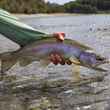

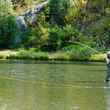

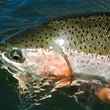


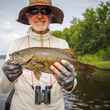
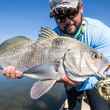
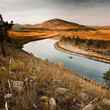

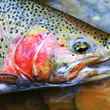
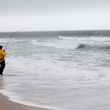




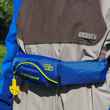
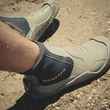
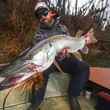

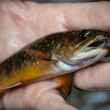
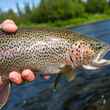
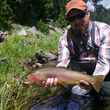

Comments
Chris Webster replied on Permalink
WOW amazing story, glad you made it out and that other fellow was there to help thanks for sharing. It is truly amazing how quickly things can go wrong. Me and my son decided to float a local river in flood stage a few years back and my son capsized and got hung up on a strainer in the middle of the river. I was able to do a pretty hairy mid river rescue. After it was over I sat on the bank with the worst case of the shakes I have ever had. Really opened my eyes and I have been super careful and conservative since. Again glad it worked out and your OK.
Chase replied on Permalink
Wow! Thankful he made it out of there. What a scary way to start off a new year. Thank you for sharing. This story could end up saving another angler's life as well.
Fred Telleen replied on Permalink
I'm fond of saying no trout or salmon is worth my life. That said, I've had some very close calls myself. Glad yours turned out as a story you can tell. Thanks for the cautionary tale.
While the Missouri River flows only change moderately, they adjust them purposefully to keep excessive ice from forming. That means ice sheets are often breaking free. I was in the same location last year when a Jet boat went by. I got out quickly. His wake caused lots of ice to break free and I later heard that an angler downstream almost perished from an impact.
Arthur Strauss replied on Permalink
Keeping a pocket knife accessible to slice open waders if you’re in dire straits is a good practice, I’ve read.
Kyle Wilkowski replied on Permalink
Glad you're still with us! This story is a great reminder for this of us who fish in winter.
toadfish replied on Permalink
An amazing story. We all have a story of trouble, due to obliviousness, or hubris, when bad things happened fast. (I may have more than one) I'm really glad to hear that there was a capable person there, willing to help you. That's the special side of human nature. He's a good man wherever he is. Let's all be like him for the new year.
Luci Dutton replied on Permalink
So glad this story has a happy ending.
Kerry Gubits replied on Permalink
I will never forget the winter day, 25 years ago, on the South Platte River in Deckers, Colorado. I turned around and saw a a giant ice sheet headed my way while I was wading chest deep. I had just enough time to make it to shore and avoid getting whacked. I have never fished with my back to the current in winter again. I had fallen in that same river ten years before, also in the winter, but fortunately I had about a third of a bottle of Canadian Club in my system at the time, about 11:00 am, and I managed to stave off hypothermia. Happy to hear of the author's good luck.
Winston A Ostrow replied on Permalink
This is a good article for us to read at this time of year. Thank you, Todd!
I remember thinking that the first time I read this cautionary tale a few years ago and I think the same thing today. I’ve known a couple of anglers who had similar experiences with ice flows on bigger rivers. I’ve seen it myself.
Here in the Driftless Area of The Midwest the rivers are mostly smaller, but the risk of hypothermia is ever-present when the temperatures are low. When you find your motor skills even slightly impaired as in extra difficulty tying knots or casting, it’s time to go home before you blunder into something really serious. When your cognitive abilities become impaired, you don’t realize it and persist when you shouldn’t. The next step may be a stumble, a fall, and a dousing. If you’re lucky, you’ll still find your way to wamth and safety. I speak from personal experience.
Brian C replied on Permalink
I now wear a auto-inflating suspender style life preserver when winter fishing in the northwest after a similar experience while out swinging for steelhead on my own. it was amazing how quickly i became almost completely helpless in the cold water. luckily i had a spare set of long underwear and fleece in a drybag under the boat seat.
Brian Mack replied on Permalink
I learned my lesson back in 1994 when I scaled a rock cliff(it had been used for years by many anglers in low water) in very high water flow. I felt a slip and a moment of panic. I made it however but took several minutes to reflect on what could have happened in those neoprene waders. I would have fallen in and swept away in a raging river canyon near Vancouver, BC. In essence I could have very easily perished.
NO FISH(Coho salmon for that day) is worth a human life.
Kimball Leighton replied on Permalink
Glad you lived to write about it. But the gratuitous mention of all the new gear you were trying out diminishes the piece. Fly fishing is, after all, a blood sport -- in more ways than one.
Pages